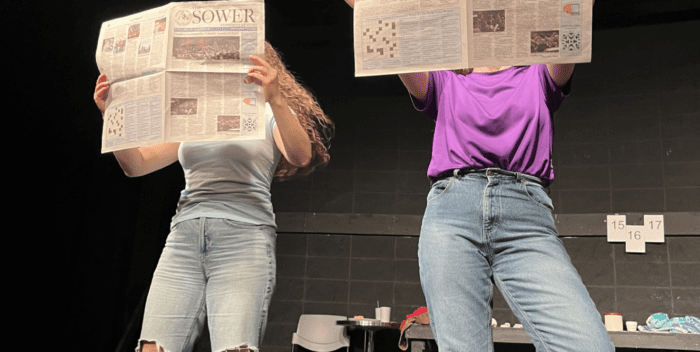Student actresses celebrate femininity through roles on stage
Madee Hudson-Knowlton (left) and Claire Horacek (right) hold up copies of The Sower in Concordia’s most recent theatrical production, “Too Much Light Makes the Baby Go Blind,” directed by Adam Prince.
Photo credit: Bailey Mooney
By Bailey Mooney and Mi-Ree Zwick
Student actresses at Concordia embrace their femininity and honor women through the roles they portray on stage.
Junior Harley Storie said it is important to continue to honor women by sharing their stories.
“The theater space could be improved for women by continuing to tell their stories,” Storie said. “Those stories should aim to include every type of woman out there, because everyone deserves to be authentically represented in the media we consume.”
Freshman Naomi Faile said she hopes to encourage other women not to give up their pursuit of acting and to utilize their strengths to improve on any perceived weakness.
“Remember that you have room to grow, always stay humble, and use your strengths as ways to improve your weaknesses,” said Faile.
Sophomore Sara Erickson said part of the joy of the theater program is when women come together to celebrate and uplift each other.
“Huge things happen when women come together, because we have such a deeply rooted loyalty and love for one another that runs deeper than the patriarchy,” Erickson said.
Actresses at Concordia have been involved in a variety of successful plays this year. Concordia recently wrapped up its production of the classic tale “Little Women,” based on the story by Louisa May Alcott. The production provided a unique opportunity to highlight strong female characters, with women cast in six of the nine roles.
Freshman Claire Horacek played Jo March and said the role invited her to learn more about navigating the process of being sympathetic.
“I kind of rolled my eyes at the character originally, but then I had to play Jo for two hours and at the end of the performance, I had a great sympathy for her,” said Horacek. “I also think sympathizing is something women are good at and is quite often recognized.”
Women at Concordia have had opportunities to play roles that encourage discussion about positive feminine qualities, but Storie acknowledged how playing both female and male roles have transformed her perceptions of gender.
“When I develop each character, I need to figure out how they view and express themselves,” Storie said. “One woman’s idea of femininity might not be like mine. Even for men, aspects about him might be feminine. I am considerate in how I can avoid playing a caricature or stereotype.”
Dr. Mira Wiegmann, who taught at Concordia and directed plays from 1986 through 2009, said every artist, regardless of gender, has to prove themselves as dedicated and skilled.
“For me this means to grow where you are planted,” she said. “I greatly value the mutually beneficial collegial relationships that I experienced at Concordia as well as some continuing friendships with my former colleagues.”
Wiegmann also noted a scarcity of jobs in the entertainment industry for men and women.
“Consider if educational theater fulfills your interests, but know that positions teaching theater in high schools or colleges are not as numerous as those for areas such as mathematics,” she said. “When one has a clear career goal, then seek the best training for that work.”
Junior Madee Hudson-Knowlton said there are a variety of opportunities at Concordia for women in theater and added she was thankful for having the chance to play dynamic, nurturing and emotional roles.
“Being able to know how to express emotion while being able to tap into a whole other character is a unique thing that women excel in,” Hudson-Knowlton said.
Erickson said that although women are seen as emotional beings. they also have talents, such as patience, and collaboration skills that are beneficial for theater.
“Providing a space for women in theater allows for celebration of women’s capabilities and talents to be encouraged in a society that doesn’t always acknowledge women’s gifts,” said Erickson.
Faile said her experience in theater shaped her perception of the shows that embrace strength and independence within female roles.
“Women’s roles in theater vary and require immense passion and attention no matter what,” she said.
Storie appreciated that women’s talents are encouraged through theater at Concordia, but still encourages society to think about the discourse involving men and emotion.
“Thinking about a character’s emotions and motivations requires reflection and the act of outward expression. In many ways this breaks this image society has of a ‘silent stoic man,’” said Storie. “I think this should be addressed more but being a woman in this space means I don’t have to confront that personally.”
Adam Prince, a senior theater major, recalled receiving support from his mother and director at a young age. H said he proudly attributes his passion for theater to women who provided him with foundational encouragement throughout his theater career.
“My love for theater comes entirely thanks to important women in my life,” said Prince.
Prince said his mother encouraged him to give theater a try in elementary school, and she believed he would thrive in the activity given the opportunity. His first performance director also took him under her wing when he was in fourth grade and has continued to be a mentor.
“My first director was named Michelle Beasley, and she taught me everything I knew about theater until I got to college,” Prince said. “She demonstrated excellence in her daily life that overflowed into her directing and into my life.”
Erickson’s mother also played a role in her career as an actress, teaching her how to face and overcome failure and rejection.
“My mother taught me to remember that the cast list does not determine who is talented enough and who is not,” said Erickson.
Erickson said this lesson taught her the importance of celebrating the accomplishments of others.
“After that, I was able to focus on celebrating the talented women who did make it,” she said. “I could also talk to those who did not make it, through their thoughts and feelings like how my mom did for me.”
Storie said the encouragement of women in theater has taught her a great deal about what feminism means to her.
“I’ve learned that femininity is all encompassing and not as rigid as people may think,” she said. “Womanhood for me is not the same as femininity, since womanhood is deeply personal and shaped by experience. Theatre has allowed me to explore different experiences in womanhood through the lens of other characters.”














